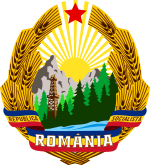
Back أطروحات يوليو Arabic Ліпеньскія тэзісы Byelorussian Tesis de julio Spanish התזות של יולי HE Tesi di luglio Italian 七月の主張 Japanese Tezele din iulie Romanian
| Part of a series on the |
| Socialist Republic of Romania |
|---|
 |
The July Theses (Romanian: Tezele din iulie) was a speech delivered by Nicolae Ceaușescu to the executive committee of the Romanian Communist Party (PCR) on 6 July 1971.
The July Theses, officially named Propuneri de măsuri pentru îmbunătățirea activității politico-ideologice, de educare marxist-leninistă a membrilor de partid, a tuturor oamenilor muncii ("Proposed measures for the improvement of political-ideological activity, of the Marxist–Leninist education of Party members, of all working people"), was a quasi-Maoist speech influenced by Ceaușescu's recent state visits to the People's Republic of China and North Korea.[1][2][3] The speech marked the beginning of a "mini-Cultural Revolution" in the Socialist Republic of Romania that saw a Neo-Stalinist reversal of the liberalization in the country since the early 1960s.[3][4][5][6] The PCR launched an offensive against cultural autonomy in Romania and returned to the guidelines of socialist realism. Strict ideological conformity in the humanities and social sciences was demanded and non-compliant intellectuals were attacked. Competence and aesthetics were to be replaced by ideology, professionals were to be replaced by agitators, and culture was once again to become an instrument for communist propaganda.[7] Romania's return to totalitarianism would be characterized by the extensive personality cult of Ceaușescu.
The July Theses, publicized as an official document of the PCR Plenum in their final version of early November 1971, carried the title: Expunere cu privire la programul PCR pentru îmbunătățirea activității ideologice, ridicarea nivelului general al cunoașterii și educația socialistă a maselor, pentru așezarea relațiilor din societatea noastră pe baza principiilor eticii și echității socialiste și comuniste ("Exposition regarding the PCR programme for improving ideological activity, raising the general level of knowledge and the socialist education of the masses, in order to arrange relations in our society on the basis of the principles of socialist and communist ethics and equity").[1]
© MMXXIII Rich X Search. We shall prevail. All rights reserved. Rich X Search